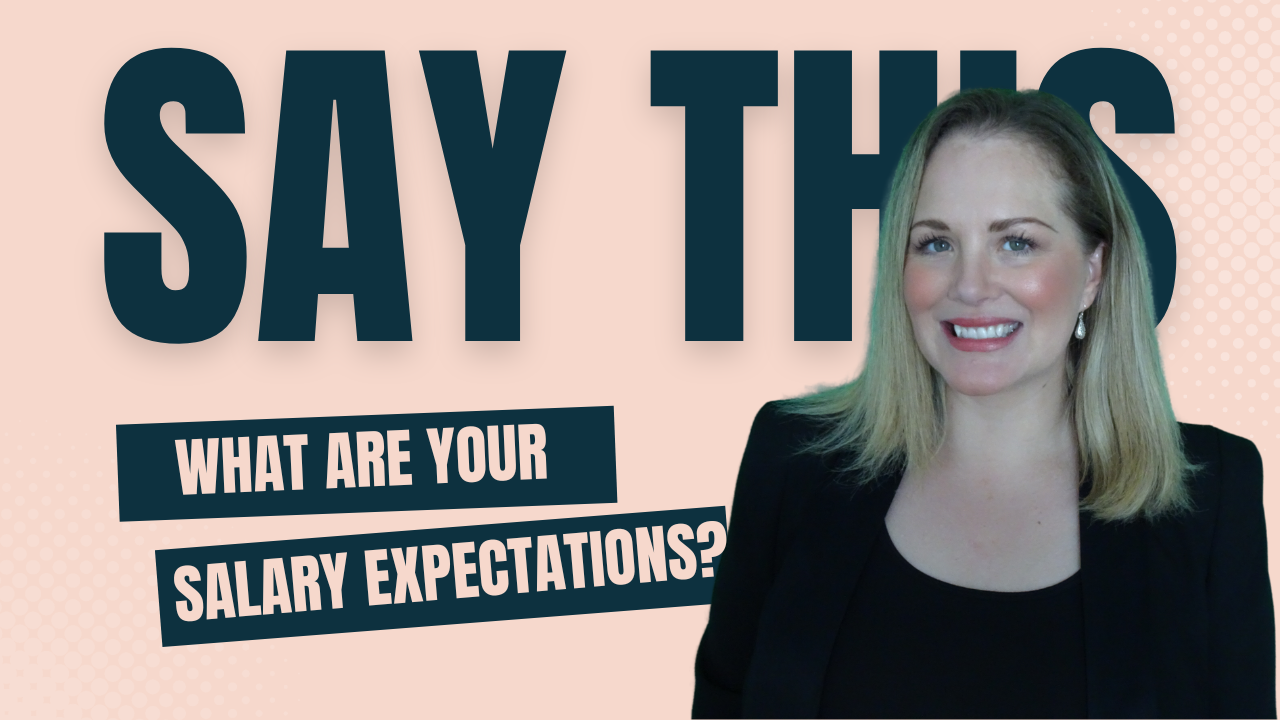
What Are Your Salary Expectations?
In this video Alicia Fairclough, Founder of EA How To, talks about salary expectations as an Executive Assistant.
Today I’m going to explain how to answer the interview question, what are your salary expectations?
For the purposes of this video, I’m going to assume that a range hasn’t been provided (super annoying, I know) and I’m going to give you three concrete examples of exactly what you can say depending on how the interviewer responds.
Hot tip… You’re not going to give an exact figure.
As with all interview questions, there is a reason this is being asked.
If it’s being asked in the early stages of the interview process, it’s being asked to eliminate you.
The company has a budget in mind for this role and they want to know if you fall in the acceptable range. They don’t know you and how amazing you are. Right now you’re just a number in a pool of candidates and they need to narrow down.
Your goal is to provide an answer that keeps you in the game and doesn’t low ball you.
If it’s being asked in the final stages it’s being asked to make sure we’re all on the same page, and to see if they are willing to accommodate you now that they know how amazing and valuable you are. That’s a different video.
Ok… So how do we not get eliminated from the process and not undervalue ourselves?
This is where your market research is super important. You need to go into the interview understanding your value in the market at this time and you need to know what you want. That means looking at similar roles on LinkedIn, checking out Glassdoor, speaking to reputable recruiters and taking a look at any industry salary reports that you have access to.
It also means giving thought to the commute, the leadership team, the kind of work you would be doing and anything else you would factor into a decision like this.
This is going to help you determine your range.
Once you’re armed with your market research you’re ready to perform an age old ritual that really should be retired.
Here’s how it goes:
Interviewer: What are your salary expectations?
Interviewee: I would hope that my salary would be in line with the market rates for similar positions in New York. What do you usually pay someone in this position?
Interviewer: We’re considering applicants in the 90 to 100K range. Does this meet your expectations?
Interviewee: Yes it does.
In this example, you put the question back on the interviewer and it worked. That’s great. But it isn’t always this easy.
Let’s take a look at the next example.
Interviewer: What is your salary expectation?
Interviewee: I would need more information about the specifics of the role and any company benefits included to be able to give you an accurate figure.
Interviewer: Ok, what questions do you have? In terms of benefits we offer a standard pension plan, medical and 30 days annual leave.
Interviewee: Do you have a range that you’re targeting?
Interviewer: We’re still determining that.
Interviewee: My decision would depend on learning more about the company and the specifics of the role but based on my research and my experience, I would estimate anywhere from 50 to 65K.
Now I said 50-65K because that’s what my market research told me the range would be for this role. Your figure will obviously be higher or lower depending on the role you’re applying for.
In this example, the interviewer was completely unwilling to budge and offer a range, which sucks but it’s what we’re dealing with sometimes.
Let’s take a look at one more example.
Interviewer: What are your salary expectations?
Interviewee: I’m open. I’m looking for the best overall fit.
Interviewer: That’s great but we’re going to need to know the range you’re considering.
Interviewee: I did some research and I found that the range for similar roles in this industry and location is 70 to 90K depending on experience. This is the range I’m looking at but it would also depend on the overall package, company culture and the specifics of the role.
Interviewer: Ok great, thank you.
You can see that the three keys to answering this question successfully are:
- Putting the question back on the interviewer
- Avoiding giving an exact figure and
- Doing your market research
I want to wish you all the best nailing that interview and getting the salary you deserve. Leave me a comment with your best ‘salary expectation’ anecdote because I absolutely love hearing this stuff from you.
Join the world's most valuable community of Executive, Personal and Virtual assistants by becoming an EA How To Plus member. You'll be joining a network of thousands of talented assistants and you'll get access to replays of amazing EA How To webinars as well as invitations to small group coaching sessions and more.

